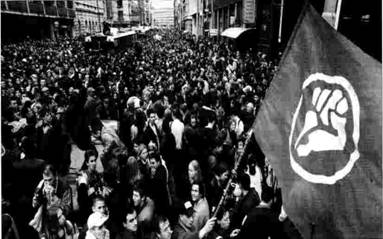Before the Gaza "war", it was a two-horse race: Livni against Netanyahu, with Netanyahu leading by a good margin in all the polls. The race became a three-horse one thanks to the Gaza “war” launched by Livni and Barak. Barak saw his ratings surge and is now back in the race. Even if he does not get elected, his party will get quite a few more seats than it had planned a few months ago.
But the frontrunner has always been Benyamin Netanyahu and he remains, in the eyes of the majority of Israel’s journalists (Gideon Levy from Haaretz) or activists (Jeff Halper from ICAHD), the more than probable future PM.
The world hopes that this election will be as “clean and democratic” (Jimmy Carter and most international observers said so) as the last Palestinian election which took place in 2006 and saw Hamas win by a large majority.
We know what happened next. To make a long story short, Israel and most of the international community refused to recognize Hamas as a legitimate party and then refused to recognize the newly-formed Palestinian unity government (formed in March 2007).
Abbas, whose goal has always been to be recognized by the US and Israel, kicked Hamas out of the government and formed a new one with Salam Fayyad, a politician and economist made in the US, as PM. A violent pre-emptive war was launched by Hamas against Fatah and Israel/US-backed militias (led by Mohammed Dahlan) and Hamas “took over” the Gaza Strip.
Even if they reacted with surprise and strongly condemned this move, the US and Israel had reached one of their long-term objectives in Palestine. “Divide and Rule” (a strategy used with great success by the US in the course of its history) was back on again with the West Bank becoming the respectable (read: cooperative) Palestinian Authority territory and Gaza turning into the Islamic and evil Hamastan.
An internationally-supported Israeli blockade of the Gaza Strip followed and once more, to cut a long story short, the Gaza “war” was launched in December 2008 by Israel. We are here today, more than 1,300 Palestinians dead and 5,000 injured later.
But why did all this happen? What was the official reason given by the Israel and the International community for not recognizing Hamas?
The reason they gave was that Hamas refused to recognize Israel and had a Charter calling for the destruction of the Jewish state.
Everyone (politicians and corporate media leaders) accepted this without asking a few important questions. Which Israel should Hamas recognize? Israel has not yet stated what its international borders are. Should Hamas recognize the Israel of 1948? The Israel of 1967? The Israel of 2009 with its apartheid wall, settlements (settlements building raised by 60 percent in 2008, the year of the Annapolis “Peace Process”, according to a Peace Now report), second class Arab citizens and with East Jerusalem annexed?
Any astute observer could also have objected by reminding people that Hamas (through Haniyeh and Meshal) had said many times over that it was willing to accept Israel as a political entity on the 1967 borders. You do not have to look hard for this, it was stated in the Guardian, Washington Post, amongst others, meaning that Hamas was now in line with most of the international community, accepting a two-state solution.
Another issue came back again and again. The problem is Hamas’s Charter, we would hear. Whatever Meshal or Haniyeh were ready to accept, the Charter came back to haunt them every time.
But what about the Charter of the Likud Party. With Netanyahu and his right-wing party ready to take over, it is only fair to find out a bit more about them.
In the "Peace and Security" chapter of the Likud Party platform, a recent document (1999) it says initially that:
"Peace is a primary objective of the State of Israel. The Likud will strengthen the existing peace agreements with the Arab states and strive to achieve peace agreements with all of Israel’s neighbors with the aim of reaching a comprehensive solution to the Arab-Israeli conflict."
But then it says about settlements:
"The Jewish communities in Judea, Samaria and Gaza are the realization of Zionist values. Settlement of the land is a clear expression of the unassailable right of the Jewish people to the Land of Israel and constitutes an important asset in the defense of the vital interests of the State of Israel. The Likud will continue to strengthen and develop these communities and will prevent their uprooting."
Therefore annihilating the slightest chance of a two-state solution.
On Palestinian self-rule it says:
"The Government of Israel flatly rejects the establishment of a Palestinian Arab state west of the Jordan river. The Palestinians can run their lives freely in the framework of self-rule, but not as an independent and sovereign state. Thus, for example, in matters of foreign affairs, security, immigration and ecology, their activity shall be limited in accordance with imperatives of Israel’s existence, security and national needs."
Therefore annihilating any chance of seeing a Palestinian sovereign state.
On Jerusalem:
"Jerusalem is the eternal, united capital of the State of Israel and only of Israel. The government will flatly reject Palestinian proposals to divide Jerusalem, including the plan to divide the city presented to the Knesset by the Arab factions and supported by many members of Labor and Meretz."
Therefore annihilating any chance for future peace negotiations because east Jerusalem as capital of a future Palestinian state is non-negotiable for any Palestinian.
We have therefore established that the Likud party charter does not recognize Palestine and will not accept a sovereign Palestinian state. The soon-to-come non-recognition of Likud by the international community and an implemented blockade on Israel should therefore not come as a surprise for Israelis.
– Frank Barat is a peace activist living in London. His articles have appeared on Counterpunch, Zmag, the Palestine Chronicle and other websites and publications. He recently directed "life under occupation" a 25 mins documentary about life in Nablus, occupied Palestine. His book of interviews between Noam Chomsky and Ilan Pappe is out now (in French). An English version should soon be available. He contributed this article to PalestineChronicle.com.






If you look into history, only Likud was able to come to agreements with Egypt and Jordan. So why not Palestine? The time will come, I’m sure 🙂